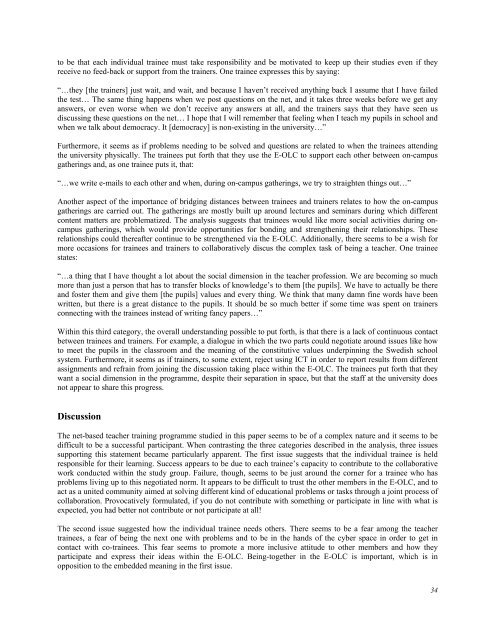October 2007 Volume 10 Number 4 - Educational Technology ...
October 2007 Volume 10 Number 4 - Educational Technology ...
October 2007 Volume 10 Number 4 - Educational Technology ...
You also want an ePaper? Increase the reach of your titles
YUMPU automatically turns print PDFs into web optimized ePapers that Google loves.
to be that each individual trainee must take responsibility and be motivated to keep up their studies even if they<br />
receive no feed-back or support from the trainers. One trainee expresses this by saying:<br />
“…they [the trainers] just wait, and wait, and because I haven’t received anything back I assume that I have failed<br />
the test… The same thing happens when we post questions on the net, and it takes three weeks before we get any<br />
answers, or even worse when we don’t receive any answers at all, and the trainers says that they have seen us<br />
discussing these questions on the net… I hope that I will remember that feeling when I teach my pupils in school and<br />
when we talk about democracy. It [democracy] is non-existing in the university…”<br />
Furthermore, it seems as if problems needing to be solved and questions are related to when the trainees attending<br />
the university physically. The trainees put forth that they use the E-OLC to support each other between on-campus<br />
gatherings and, as one trainee puts it, that:<br />
“…we write e-mails to each other and when, during on-campus gatherings, we try to straighten things out…”<br />
Another aspect of the importance of bridging distances between trainees and trainers relates to how the on-campus<br />
gatherings are carried out. The gatherings are mostly built up around lectures and seminars during which different<br />
content matters are problematized. The analysis suggests that trainees would like more social activities during oncampus<br />
gatherings, which would provide opportunities for bonding and strengthening their relationships. These<br />
relationships could thereafter continue to be strengthened via the E-OLC. Additionally, there seems to be a wish for<br />
more occasions for trainees and trainers to collaboratively discus the complex task of being a teacher. One trainee<br />
states:<br />
“…a thing that I have thought a lot about the social dimension in the teacher profession. We are becoming so much<br />
more than just a person that has to transfer blocks of knowledge’s to them [the pupils]. We have to actually be there<br />
and foster them and give them [the pupils] values and every thing. We think that many damn fine words have been<br />
written, but there is a great distance to the pupils. It should be so much better if some time was spent on trainers<br />
connecting with the trainees instead of writing fancy papers…”<br />
Within this third category, the overall understanding possible to put forth, is that there is a lack of continuous contact<br />
between trainees and trainers. For example, a dialogue in which the two parts could negotiate around issues like how<br />
to meet the pupils in the classroom and the meaning of the constitutive values underpinning the Swedish school<br />
system. Furthermore, it seems as if trainers, to some extent, reject using ICT in order to report results from different<br />
assignments and refrain from joining the discussion taking place within the E-OLC. The trainees put forth that they<br />
want a social dimension in the programme, despite their separation in space, but that the staff at the university does<br />
not appear to share this progress.<br />
Discussion<br />
The net-based teacher training programme studied in this paper seems to be of a complex nature and it seems to be<br />
difficult to be a successful participant. When contrasting the three categories described in the analysis, three issues<br />
supporting this statement became particularly apparent. The first issue suggests that the individual trainee is held<br />
responsible for their learning. Success appears to be due to each trainee’s capacity to contribute to the collaborative<br />
work conducted within the study group. Failure, though, seems to be just around the corner for a trainee who has<br />
problems living up to this negotiated norm. It appears to be difficult to trust the other members in the E-OLC, and to<br />
act as a united community aimed at solving different kind of educational problems or tasks through a joint process of<br />
collaboration. Provocatively formulated, if you do not contribute with something or participate in line with what is<br />
expected, you had better not contribute or not participate at all!<br />
The second issue suggested how the individual trainee needs others. There seems to be a fear among the teacher<br />
trainees, a fear of being the next one with problems and to be in the hands of the cyber space in order to get in<br />
contact with co-trainees. This fear seems to promote a more inclusive attitude to other members and how they<br />
participate and express their ideas within the E-OLC. Being-together in the E-OLC is important, which is in<br />
opposition to the embedded meaning in the first issue.<br />
34

















